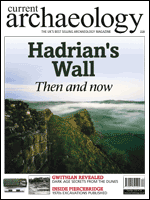 This month, everyone is talking about the Roman emperor Hadrian (in advance of the opening of the new exhibit at the British Museum); so who are we to go against the flow? However, we’ve done our best to give it the special Current Archaeology touch, bringing our readers a feature from one of the world’s great experts on Hadrian’s Wall, as well as a brief but illuminating examination of why Hadrian mattered so much to Britain. To round out our taste for all things Roman this issue, we’ve taken an in-depth look at the finally-published 1970s excavations at Piercebridge, and, last but not least, included a fascinating case study of how Portable Antiquities Scheme data is changing our understanding of Roman coinage. Finally, we travel down to Gwithian in Cornwall, where the publication of this landmark site is finally underway. Happy reading!
This month, everyone is talking about the Roman emperor Hadrian (in advance of the opening of the new exhibit at the British Museum); so who are we to go against the flow? However, we’ve done our best to give it the special Current Archaeology touch, bringing our readers a feature from one of the world’s great experts on Hadrian’s Wall, as well as a brief but illuminating examination of why Hadrian mattered so much to Britain. To round out our taste for all things Roman this issue, we’ve taken an in-depth look at the finally-published 1970s excavations at Piercebridge, and, last but not least, included a fascinating case study of how Portable Antiquities Scheme data is changing our understanding of Roman coinage. Finally, we travel down to Gwithian in Cornwall, where the publication of this landmark site is finally underway. Happy reading!
FEATURES
DARK AGE SECRETS FROM THE DUNES
In January 1953, Charles Thomas picked up shell, bone and a few potsherds that had been kicked out of rabbit holes in the grassy dunes located in the tidal estuary of the Red River. His investigation of Gwithian was one of the great excavations of the 1950s and a landmark in Dark Age studies. With the archive now being published, we look at the significance of the discoveries at this pioneering Cornish site.
THE RISE AND FALL OF ROMAN PIERCEBRIDGE
For readers with long memories and a fairly full set of back issues, the site at Piercebridge should be familiar. Everyone assumed there must have been an Early Roman fort at Piercebridge in County Durham; after all, the site is on Dere Street, the Roman highway to the northern frontier. However, the story that must now be told is very different, as Hilary Cool details in her review of the publication of these landmark 1970s excavations.
HADRIAN IN BRITAIN
The ‘strategic turn’ that the Roman emperor Hadrian executed during his reign was to be one of hinges on which Roman history turned. Britain was among the first provinces Hadrian visited to initiate the revolutionary programme of work that would embody his vision — creating the single greatest monument to that vision in the entire empire. Features Editor Neil Faulkner discusses Hadrian’s visit to Britain in AD 122.
HADRIAN’S WALL 30 YEARS ON
Thirty years ago, David Breeze and Brian Dobson wrote a revolutionary history of Hadrian’s Wall from the archaeological evidence. Departing from the standard guide-book views and challenging the accepted scholarship of the wall popular at the time, it is one of the most successful archaeology books ever written. With a major new British Museum exhibition devoted to Hadrian opening in July, we asked David Breeze to take a fresh look at the emperor’s greatest monument in the light of 30 years’ further research.
NUMISMATIC ENIGMAS
The work of the Portable Antiquities Scheme continues to expand our understanding of artefact distribution across the UK, often challenging preconceived notions of settlement patterns, economy and migration. Sam Moorhead, Finds Adviser for Iron Age and Roman coins in the Department of Treasure and Portable Antiquities at the British Museum, now reports on a specific instance of how metal-detector finds are changing our understanding about the coinage of late-Roman and sub-Roman Britain.
LAST WORD
Our Editor in Chief asks: Just how popular IS archaeology?
ODD SOCS
The Society for the History of Medieval Technology and Science



